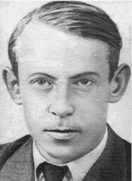Skip to: site menu | section menu | main content
Welcome To Democracy And Socialism .Com
Things should be made as simple as possible, but not any simpler- Albert Einstein
George Politzer (1903-1942) |
 |
George Politzer was a writer, philosopher, psychologist, and a Marxist theoretician who became a member of the resistant movement against Fascism, and the Nazi occupation in France.
Politzer was born on May 3rd , in Nagyvarad, Hungary in present-day Oradea, Romania. At the age of 16, together with his father, he was involved in the revolution that established the Hungarian Soviet Republic - second after the Russian Soviet Republic. The Republic lasted from March 21st 1919, until August first of that year, when forces of the kingdom of Romania with the help of France, UK, and US imperialists occupied Budapest.
The short lived Hungarian Soviet Republic decreed the abolition of aristocratic titles and privileges, separation of church and state, codified freedom of speech and assembly, free education, language and cultural rights to minorities.
The H. S. Republic also nationalized industrial and commercial enterprises, and socialized housing, medicine, transport, cultural institutions, banking, and all landholdings of more than 40 hectares. These revolutionary reforms which helped millions of workers and oppressed peoples were faced with aggressive counter-revolutionary actions of extremely small percentages of the population: the oligarchy and their global imperialist supporters.
Politzer went into exile during the White Terror that took place after the reestablishment of the Kingdom of Hungary. Many were executed by firing squads. All achievements of the Revolution were reversed.
Young Politzer first resided in Vienna where he met psychoanalysts Sigmund Freud and Sandor Ferenczi. In 1921, he finally settled in Paris and as a French citizen joined the French Communist Party in early 1929.
Politzer was first interested in nascent Freudian psychoanalysis, but he later distanced himself from it. After five years of study he acquired the necessary academic degrees to occupy the post of professor of philosophy at Lycée Marcelin Berthelot in the town of Saint-Maur-des Fosses, in the South-eastern suburbs of Paris. During the same period he was assigned to deliver a course on dialectical materialism at the Workers University of Paris which was founded by the Communist Party. The University continued to function until the German Nazi occupation of France in May 1940.
With WWII sweeping across Europe, Politzer mobilized to Paris under the French Communist Party secret command. Demobilized in July 1940, he was assigned to oversee the edition of the clandestine Party’s bulletin.
In October 1940, his comrade and friend Paul Langevin, previously a doctoral student of Pierre Curie and a prominent French physicist was arrested by the Fascist Vichy government. Politzer alongside Valentin Feldman, Jacques Decour, and Jacques Solomon published the first edition of The Free University, whereby they denounced the imprisonment of scholars and extortions committed by the fascist occupiers during WWII. Overall five editions of The Free University were published until their arrest in 1942. They underwent torture and were turned over to the Nazis on March 20, 1942. They were executed few months later by firing squad at their hands; Politzer was 39 years old.
Politzer's second wife Mai, also a communist and a resister, was arrested on the same day and transported to Auschwitz where she died one year later in March 1943.
Politzer believed that Freud had revolutionized the science of man by inventing a method that could be used to grasp the individual in his singularity, while avoiding the abstractions that characterized contemporary psychology. But when Freud tried to establish a theoretical foundation for his general intuitions, he fell into the grip of classical psychology with its emphasis on formalism, abstraction, and realism.
Politzer strongly criticized the Freud discussion of regression, where he sees a resurgence of psychological realism in the materialist concept of the psychic apparatus. He also felt that the concept of the unconscious belonged more to nineteenth- century philosophy and traditional psychology, and was an obscure concept that negated the real inspiration of psychoanalysis. He outlined the conflict between Freud’s method and his theories, a dichotomy later picked up by many other philosophers especially Jean-Paul Sartre and Maurice Merleau-Ponty.
Politzer’s posthumous work, Elementary Principles of Philosophy, based on notes taken by his followers, was translated in many languages and had a great task in understanding of the concept of Marxism-Leninism.
His famous works:
Critque of the Foundation of Psychology, 1928
Bergsonism, a Philosophical Hoax, Editions Sociales
Blood and Gold or Gold Vanquished by Blood, 1940
Revolution and Counter-revolution in the 29th Century, March 1941
The Crisis of Contemporary Psychology, 1947
Elementary Principles of Philosophy, notes taken from 1935-1936, 1954
Principles of Socialism and Communism, 1969
Writing 1 Philosophy and Myths, 1973
Writing 2 The Foundation of Psychology, Editions Sociales